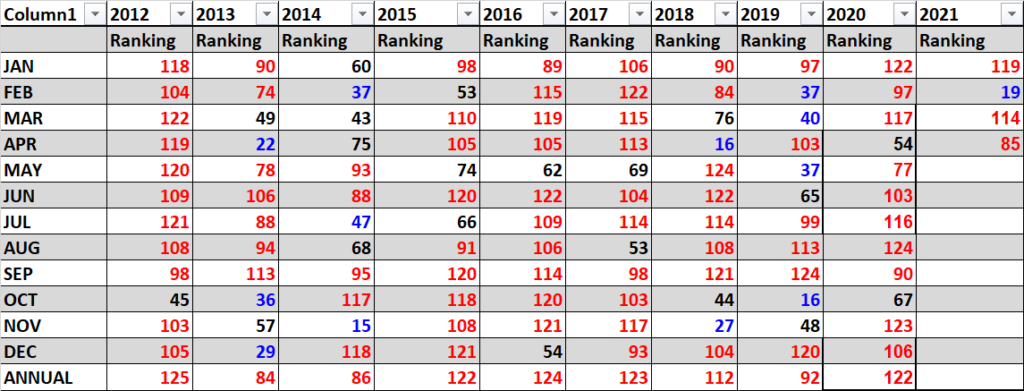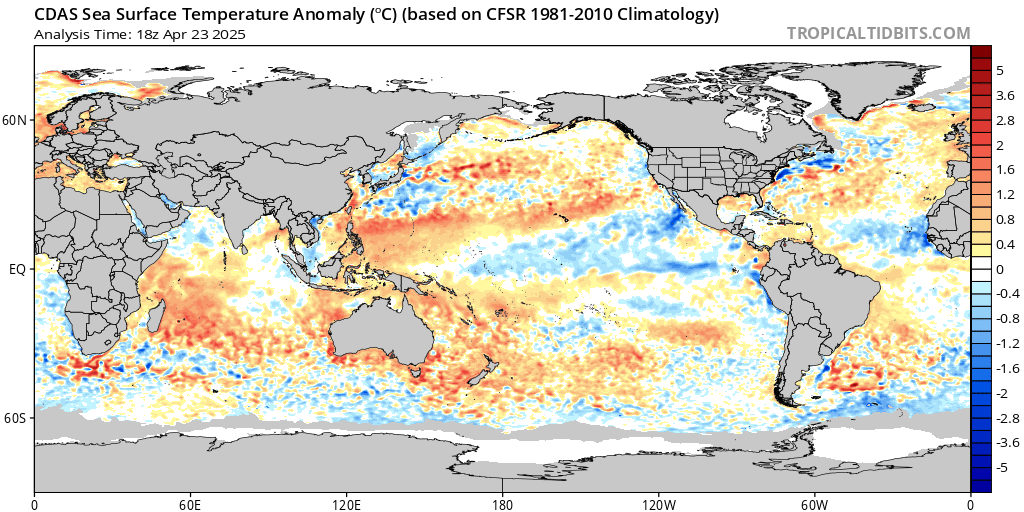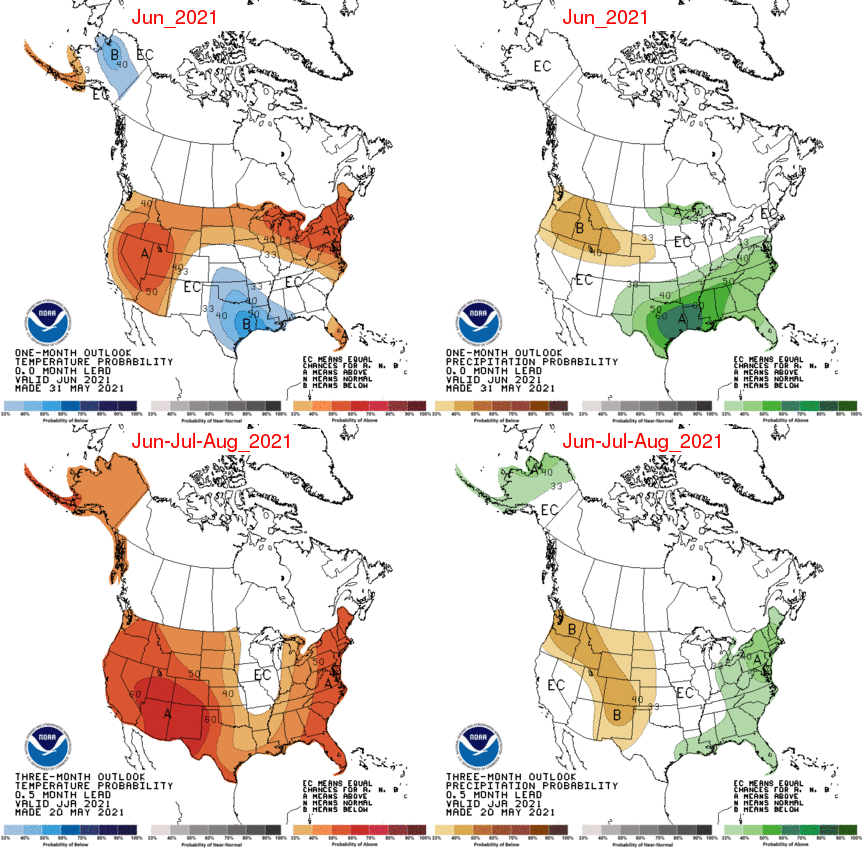Dear Diary. The main purpose of this ongoing blog will be to track global extreme or record temperatures related to climate change. Any reports I see of ETs will be listed below the main topic of the day. I’ll refer to extreme or record temperatures as ETs (not extraterrestrials).😉
Main Topic: U.S. Average Temperature Summer Forecast
Dear Diary. Welcome to boreal or meteorological summer if you live in the United States, or the three months that are June, July and August. It’s time for me to make another attempt at a forecast for average seasonal temperatures in the U.S. This forecast will be very broad and not specific for any one state comprising the continental United States (or lower 48 states).
So how will boreal Summer 2021 stack up compared to long term temperature averages across the United States? Will we continue to see the climate crisis signature of warmer than average conditions? Let’s try to make a forecast as usual at the start of a new season.
So how did the forecast work out for Spring 2021? Here is a link to the post for that forecast:
By June 7th the National Center for Environmental Information will finish their assessment for Spring 2021, so our verification is not complete as of June 1st. Let’s do fill in ranking numbers with 1 being the coldest and 126 warmest for a verification for 2021 months through April, which have already been assessed:

I’ll complete the Spring 2021 verification for this post around June 7th when NCEI processes their numbers:

And here is that verification: The ranking for Spring 2021 verified at 107, or 107th coolest since 1895.
Here are my two cents for a broad, rough forecast for the U.S. for Summer 2021, which I guarantee to be warmer than this past spring, of course, as the amount of daylight increases across the Northern Hemisphere. First, I like to look at water temperature anomalies surrounding North America just before the start of a season to get a sense of how much potential heat can be added to the atmosphere across the continent. Here is what we see:

This time around we see some cool pockets of water mainly off the West Coast with some on the Gulf and East Coasts. These would be negative factors. The La Niña that has been present for the last year has become neutral and is a neutral factor.
Second, I like to look at the strength of the Hudson Bay low or polar vortex at the start of any season:

Here we see a relatively weak low dislodged northeast of Hudson Bay. In truth the last couple of months, this low has not remained in place across eastern Canada very long, and we have had various splits in jet stream flow, so I would expect that any cold air advection into the U.S. would not last long into the summer months with a continuation of this weather pattern. Here we have a positive factor.
Here is the National Weather Service forecast for Summer 2021:
https://www.weather.gov/ffc/outlooks

I can’t argue with this NWS forecast. Once more the Midwest may turn out to be the relative cool spot. The Midwest has been the slowest region to warm in this age of global warming, and researchers are hard at work trying to know why.
Overall, Summer 2021 will probably verify above average looking at trends from the rest of the planet.
Last, we can get another clue looking at prior National Center for Environmental Information ranking and temperature record count data. For this I like to drag out that “Record Scoreboard” (updated through 5/28/2021):

Notice that after 2-5 months of above average conditions we have been seeing a below average month. For the spring it looks like May was that slightly cooler than average month, If not, we are due for one sometime during summer. It’s cringeworthy to think that once we see another strong El Niño these cool months will be all warm with our blue colors disappearing from my charts.
Two out of the three summer months should be above average, but I doubt that any will approach a top ten ranking. One month may see a colder than average ranking below 63, but of course I can’t tell which one. (Here are avg. rankings per year for the lower 48 states since 1895):
https://www.ncdc.noaa.gov/cag/national/rankings/110/tavg/202004
Not all seasons in the near future will see above average temperatures, but seasonal forecasters are beginning to ”chuck it,” discounting colder than average scenarios due to carbon pollution.
Again, here are all seasons ranked for the last decade:

Here is my bottom line forecast for Summer 2021:
“I think that this summer will be ranked slightly above average. Carbon pollution is definitely making below average seasons more rare. I’m going to guess that the Summer 2020 ranking will be around 80 + or – 10, with near average confidence given all of the factors on this post.”
Notice that the past six summers had a ranking at or above 101. The big El Nino event of 2015/16 really spiked global temperatures as well as those for the U.S. My summer forecast for 2021 is for relatively cooler conditions than that of the last six summers, which is slightly going out on a limb. We will see.
As of 2021 the top ranking for any month or season would be 126 since climatological rankings for the United States started in the year 1895. I think that this summer will be ranked at least as high as 80. Carbon pollution is definitely making below average seasons more rare. As stated, I’m going to guess that the summer of 2021 ranking will be around 80 + or – 10, but with average confidence given all of the factors in this post.
We will see how this forecast pans out around September 7th, 2021.
Here is some May 2021 climatology:
Here is an “ET” list from Tuesday:
Here is more climate and weather news from Monday:
(As usual, this will be a fluid post in which more information gets added during the day as it crosses my radar, crediting all who have put it on-line. Items will be archived on this site for posterity. In most instances click on the pictures of each tweet to see each article. The most noteworthy items will be listed first.)
Now here are some of today’s articles and notes on the horrid COVID-19 pandemic:
(If you like these posts and my work please contribute via the PayPal widget, which has recently been added to this site. Thanks in advance for any support.)
Guy Walton “The Climate Guy”